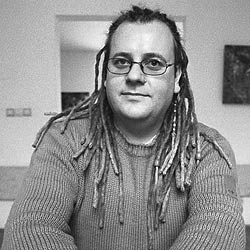log #473: diasporaFrom diaspora to diversities. The
mission statement of the team running a „World Culture Center" named „Esperanza"
(„Hope") in Skopje (Macedonia) contains: „World Culture is an open,
diverse, pluralistic, non-hierarchical aggregate of cultural practices, communicating
among themselves through structural or incidental, systemic or programmatic, hierarchical
or subversive cultural policies, economic undertakings or social movements."
| Robert Alagjozovski marked the starting point
of a collaborative project with a sentence of philosopher Etienne Balibar: "Europe
always remains heterogeneous and differs from itself as much as it differs from
others". It seems, after a short period of
nationalism, we forgot what made Europe.
As contemporary art practice is not suitable to an ideology
of closed borders, we search for dialog and collaboration with people who made complete
different experiences growing up in quite different societies. So we are linked to a
project, the Esperanza-Crew developed: |
 Robert
Alagjozovski |
From diaspora to
diversities.
Transformative action for diasporic art&cultural diversity management
It will start next summer and end in april 2017: "The
project ‚From diaspora to diversities’ was inspired by the urgent necessity to
address the diasporic art practices originating from Western Balkans artists. It would
initiate new understanding of the diasporic notions that would diminish the old-fashioned
abuse by the nationalistic circles."
We got to take responsibility on the local and regional public debates: „The
discourse of diaspora and artistic practices of diasporic subjects have mainly been used
by the nationalistic cultural and political elites in the region."
Esperanza started to create a cooperative platform of cultural managers, artists,
theoreticians, curators that would apply change in the broader socio-political
understanding of diaspora, exploring and enabling artistic and cultural diasporic
practices, helping their visibility and fostering their integration as dialogical cultural
diversity in both new and old homelands.

Esperanza goes for raising critical discussion and
knowledge transfer regarding the notions of diaspora. We get part of this mission to
explore artistic and curatorial practices based on diasporic concepts and subjectivity.
This means also prooving the antiquated way of thinking, that is establishing an 19th
century-kind of center-province-relationship.
So the team asked: „Why traditions are significantly invented in retrospective
affiliations?" And: „Where is the space of the transmigrational groups and
non-citizen classes, such as immigrants, economic migrants, exiles, refugees and illegal
aliens?"
One of the questions I am interested the most, is: „Can there emerge different
kind of citizenship -- flexible, diasporic, and nomadic?"
+) The basic setting associated with Esperanza:
- Kunst Ost – Cultural Laboratory (Martin Krusche), Gleisdorf,
Austria
- Oracle network of European cult. managers (Ljiljana Simic Deru),
Brussels, Belgium
- Remont – Independent Artistic Association (Miroslav Karic),
Beograd, Serbia

As Kunst Ost is running a work in
progress, we now prepare to be ready for the first steps of the Esperanza-Crew
and our colleagues, so we can find the next links of collaboration.
+) Head of our working community is Mirjana Peitler-Selakov (art
histoarian/curator)
+) Project manager: Martin Krusche (artist)
+) Basic working community Kunst Ost („Kulturspange")
- GŁnther Marchner (scientist)
- Selman Trtovac (artist)
- Ewald Ulrich (entrepreneur)
-- [Diaspora] [Esperanza] [Generaldokumentation] --
core
| reset | home
9•15 |